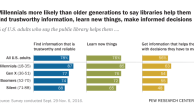
As this week is Children’s Book Week, we took a closer look at our data on children and reading from our recent report on parents, children, libraries, and reading. To begin with, most parents read to their children regularly: About half of all parents with children under 12 at home say they read to their child every day, and another quarter say they do so a few times a week.
We also found that parents with younger children read more often to their children than the parents of older children. Almost six in ten parents whose youngest child is under the age of six say they read to their child every day, compared with about one in three parents whose youngest child is 6 to 11 years old.
Interestingly, parents who have both young children and teenagers in the house are less likely to read to their young children every day than parents who only have children under 12 (29% vs. 60%).

Another major finding was that parents say libraries are very important resources for developing their children’s reading habits. In our national phone survey, for instance, 94% of parents say that libraries are important for their children, and more than eight in ten (84%) of these parents say a major reason they view the library as important is that it helps to develop a love of reading and books.

We also see this reflected in children’s library use. Among the 70% of parents who say their child visited a public library in the past 12 months, 87% say their child did so in order to borrow books — the most common reason reported by parents. Younger children and older children were equally likely to visit the library for this reason, as shown in the chart below.

Finally, in the course of gathering material for our report, we asked librarians from around the country open-ended questions about their thoughts on various library services via online questionnaires and in-person and online focus groups. In their responses, many library staff members said they thought services for early childhood literacy, including story times and summer reading programs, were among the most important services their libraries offered:
“If you’re trying to raise a reader, you need your library. It’s too expensive and somewhat wasteful to buy the hundreds of books a young reader goes through in those first years of learning to read.”
“[One of public libraries’ strengths is] being a child’s doorway to literacy.”
“I think children’s programs will always be the foundation of public libraries. Parents will always want their kids to participate in story time and such and there is no technology that can replace that experience.”
“We are always looking forward, adopting new technologies, identifying trends and planning for anticipated needs—while at the same time, adhering to what has worked well in the past. Storytimes to preschoolers has been an important part of library service to children for over fifty years. It is more important today than ever before to teach parents how to read aloud to their children.”
Do you read to your children? Have your children’s reading habits or library use changed in recent years? Share your thoughts on children, reading, and libraries on our Facebook page.




